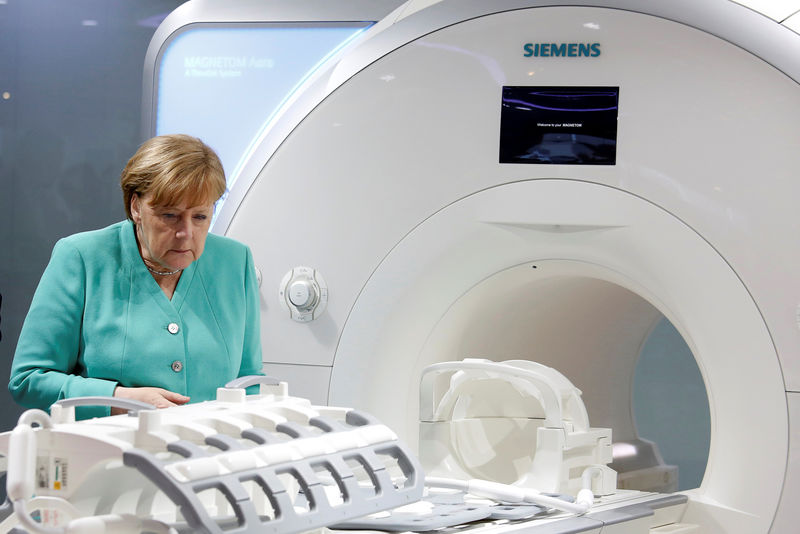By Noah Barkin and Caroline Copley
BERLIN (Reuters) - European and U.S. pharmaceutical associations have waded into a diplomatic row between Germany and Saudi Arabia, warning that ongoing restrictions on German-made drugs could hurt Saudi patients and dampen future investment in the kingdom.
In a strongly worded letter to Crown Prince Mohammed bin Salman, a copy of which has been seen by Reuters, the associations highlighted the level of concern in Germany and elsewhere about restrictive procurement measures implemented by Riyadh in response to criticism of its policies.
While a human rights row between Canada and Saudi Arabia has dominated headlines in recent weeks, Germany has been embroiled in its own spat with the oil-rich kingdom since November.
Germany's foreign minister at the time, Sigmar Gabriel, condemned "adventurism" in the Middle East in comments perceived by some as an attack on increasingly assertive Saudi policies. Riyadh dismissed the comments as "shameful" and withdrew its ambassador to Germany.
Since then, Chancellor Angela Merkel has tried to ease the tensions, speaking to Prince Mohammed by telephone. But the row has rumbled on and German officials say companies such as Siemens Healthineers (DE:SHLG), Bayer (DE:BAYGn) and Boehringer Ingelheim are being excluded from public healthcare tenders in Saudi Arabia.
"For the past six months German healthcare companies have been having trouble doing business in Saudi Arabia," said Oliver Oehms of the German chamber of commerce and industry in Riyadh. "It is not a general boycott, but the healthcare sector is clearly suffering."
The dilemma for Berlin has been deepened by the Canada-Saudi dispute, which was triggered by a tweet from the Canadian foreign minister calling for the release of human rights activists in Saudi Arabia.
The kingdom responded by expelling the Canadian ambassador, recalling its own envoy, freezing new trade and investment, suspending flights and ordering Saudi students to leave Canada.
Some German politicians have denounced the Saudi reaction, but the government has remained conspicuously quiet for fear of sabotaging its own conciliation efforts.
'MAJOR NEGATIVE EFFECTS'
News that Saudi Arabia was punishing German companies broke in May. But the existence of the letter, dated June 12 and addressed to Prince Mohammed, has not been reported previously..
"This action could have major negative effects on the sustainable supply of innovative, critically necessary medicines for the treatment of patients in the Kingdom of Saudi Arabia," the letter from the German (VFA), European (EFPIA) and American (PhRMA) pharmaceutical associations reads.
It says a decision to exclude German-made products from the centralized Saudi procurement process for medical supplies "is likely to significantly dampen industry's perception of Saudi Arabia as a site for future investment in innovative medicines".
The associations declined to comment further, but German officials said there had been no response from the Saudis or an improvement in their situation since the letter was sent.
The Saudi authorities did not respond immediately to a request for comment.
Saudi Arabia is the largest pharmaceuticals market in the Middle East and Africa, with sales of $7.6 billion last year, according to healthcare information company IQVIA.
With a growing burden of chronic diseases tied to a more Western lifestyle, Saudi Arabia's overall drugs market is growing at 10 percent a year and the tender sector is expanding by about 30 percent.
Neither Bayer nor Boehringer rank among the top 10 drug suppliers in Saudi Arabia. That list is led by Novartis (S:NOVN), Pfizer (N:PFE) and local manufacturer Tabuk, according to IQVIA.
German exports to Saudi Arabia fell 5 percent in the first half of 2018. They totaled 6.6 billion euros in 2017, with an estimated 15 percent coming from the healthcare sector.
AMERICAN HELP
Bayer and Boehringer declined to comment. But Siemens Healthineers, which makes X-ray and MRI machines as well as diagnostic equipment, acknowledged that its business in Saudi Arabia had been affected and said it had turned to U.S. authorities for help in ending the impasse.
"The decision of the Saudi Arabian government indeed has an impact on our local business," said a spokesman for the Siemens unit, which does not provide a breakdown of its Saudi business.
"We are working on a solution together with U.S. authorities to utilize our global value chain to overcome the restrictions of the Saudi Health Ministry," he added, declining to provide further details.
The company employs about 13,000 people in the United States, more than a quarter of its global workforce, and could make the case to American authorities that its U.S. operations and jobs will be hit if Saudi restrictions are not lifted.
It could also rejig supply routes to send more products from the United States instead of Germany.
Johann Wadephul, a senior member of parliament from Merkel's conservative Christian Democrats (CDU), described the row with Saudi Arabia "very damaging".
"Should there be solidarity with Canada? Yes. But I don't think this should be the focus of German foreign policy in the region," he told Reuters.

"The focus should be on improving relations with Saudi Arabia. Unfortunately, we haven't achieved this so far."